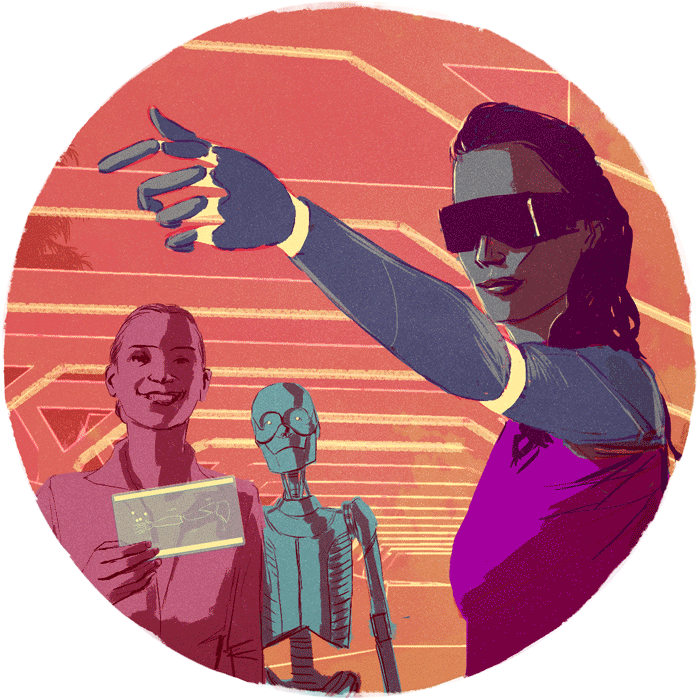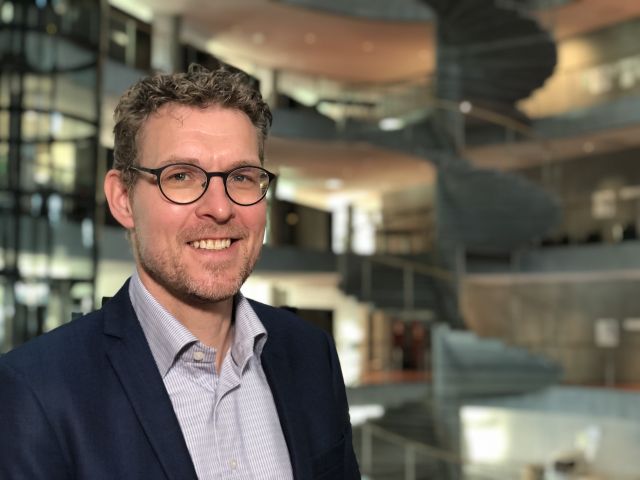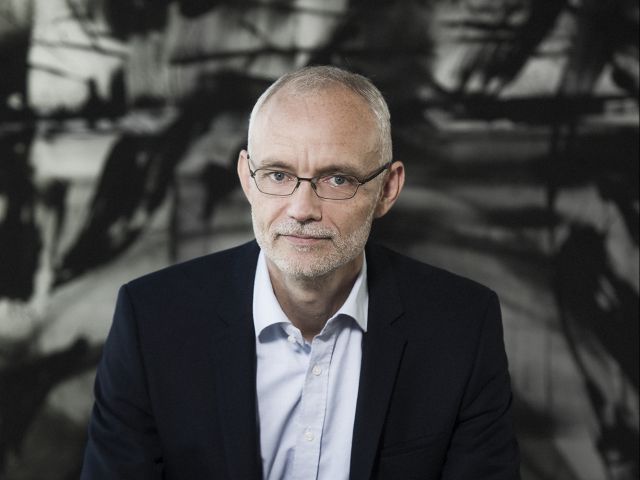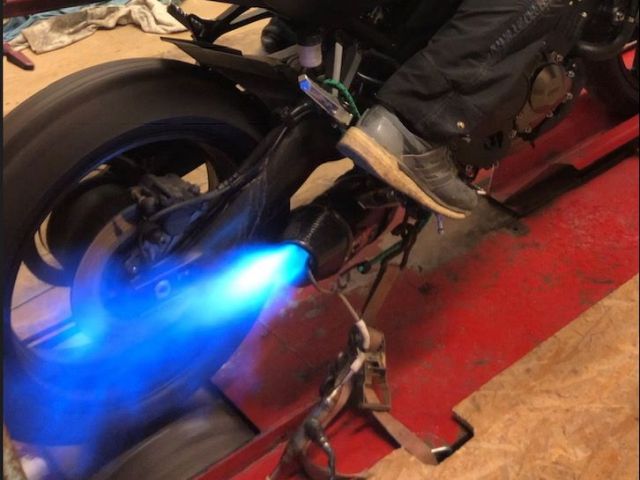“If you know the answer, it’s not transformative”

(Illustration: Shutterstock)
We are at risk of having inadequate job skills, dysfunctional pension systems and suffering from energy poverty if transformation is overdue, three economists claim. CBS’ new strategy calls for transformation, and in a new article series CBS WIRE ask researchers what it looks like.
The Cambridge Dictionary defines the word transformation as:
“A complete change in the appearance or character of something or someone, especially so that that thing or person is improved”.
The word transformation is a pivotal element of CBS’ new strategy, which aims to “transform business with society”. But where is the transformation needed, and what does it look like?
Moira Daly, Senior Advisor at the Department of Economics puts it this way:
“Looking back, you can’t imagine 2020 without the word transformation. Covid-19 forced us to transform overnight,” she says and continues:
“When CBS started developing its strategy in 2019, I guess no one had any idea how important transformation would be.”
I have called up the three economists, Senior Advisor Moira Daly, Postdoc Andrea Tafuro and Postdoc Manuel Llorca from the Department of Economics at CBS, for their views on where they see the need for transformation and what transformational research is to them.
In search of pension reforms
Andrea Tafuro’s eyes are set on the European pension systems. According to him, they will need to transform to match the aging population, and preferably that transformation should result in a European pension platform.
Right now, the European countries have different pension systems. For example, in Denmark people usually retire at around the age of 67, but in other countries people retire just after they have turned 60. Many countries have also reformed their systems, which can make the rules and regulations even more difficult to grasp.
We need to understand the consequences of reforms and systems for our pension prospects if we want an idea about how Europe can move forwards and transform its system
Andrea Tafuro
On top of that, Europe is facing the problem of an aging population. People are living longer, which can mean two things: either the retirement age must rise, or people will need to stretch their pensions further.
So in order to transform the systems, Andrea Tafuro wants to figure out what reforms and systems are less harmful to the economy. And sooner rather than later.
“Right now, most countries have large public debts because of the current crisis, and this reduces the amount of money available for senior citizens, investments, etc. And if you use government resources to pay for pensions, you have less money for hospitals and education, so reforms are required,” he says.
Andrea Tafuro hopes a European pension platform will gather knowledge on the effects of different reforms, and produce a pension reform strategy that is less harmful to the European economies.
“We have seen examples of reforms introduced right after the financial crisis that actually prolonged the negative effects of the crisis, and it is knowledge like that we’d like to gather. We need to understand the consequences of reforms and systems for our pension prospects if we want an idea about how Europe can move forwards and transform its systems,” he says.
Transforming working skills
If we want to enjoy our well-earned pensions, we need to work. In 2019, the expected average working life for the European Union’s adult population aged 15 years and more was 35.9 years, according to Eurostat. That is an increase of 3.6 years since 2000.
But if we want to keep working, we may need to upgrade our skills as skill demands are transforming, says Moira Daly.
“The demand for skills at work has always changed. We have seen a shift in demand for skills in the manufacturing sector resulting from the adoption of new technology. In the 90s, we saw the beginning of job polarization: computers took the jobs of middle skill routine tasks, but helped high-skill labor,” she explains and continues:
“Now, we will probably see a similar effect in the coming years, as more new technologies, such as artificial intelligence, take root and potentially substitute for even some of the highest skill jobs.”
In order to understand the future demand for skills and prepare for the subsequent impacts on workers, Moira Daly, along with several other economists is trying to describe how our job market is changing. One way of doing that is through monitoring data from online job posts, as those describe the skills required for various jobs in real time.
“If we want to keep up to date with this changing landscape, understand the Danish skill frontier and our ability to reach it, we need to observe how demand is changing, who benefits and who does not,” she says.

Understanding these changes in skill demand is crucial, and ultimately Moira Daly hopes that her research can be used by politymakers seeking to shape, and optimally equip, tomorrow’s workforce.
“New technologies can have heterogeneous effects on different groups of employees, and more generally on different members of society. Research aimed at understanding these effects can allow our society to prepare for and deal with the transformation,” she says.
Energy security
At the moment, many people are working from home. This may result in employees receiving larger electricity bills, as one or more computers and tablets will be plugged in at home rather than at work. And looking at the energy sector, the need for electricity is only going one way – up.
According to BloombergNEF, by 2050, global electricity demand will have increased by 57%.
And if we want to meet the demand a transformation of the energy sector is needed, argues Manuel Llorca, who calls himself an energy economist who is part of CSEI, an Energy Economics research group at the Department of Economics at CBS.
He specializes in finding applicable solutions to energy-related issues.
Currently, the energy sector operates with separated in silos like gas and electricity. But the different silos must be interconnected if energy issues, such as energy poverty, are to be solved and climate goals are to be achieved, explains Manuel Llorca.
“Reaching climate neutrality in Europe by 2050 may seem like a long-term goal, but many steps must be taken before we get there. And one thing we need is an adequate energy infrastructure across countries as well as ways to store the renewable energy we produce, so it can be exchanged and dispatched,” he says.

Manuel Llorca explains that, in some countries, some households are suffering from energy poverty in the sense that they lack energy for heating in winter, for example. An interconnected energy sector could potentially contribute to solve that problem.
“The sun does not always shine, and sometimes there is no wind, and then we must be able to store and exchange electricity between countries, so it can be consumed when and where it is more needed. And that also has the potential to improve energy equity,” he says and pictures large energy islands that both produce and store energy as one of the possible solutions for the challenges of the energy sector.
Manuel Llorca’s contribution to the transformation is research. For example, he has analyzed the cost-efficiency of electricity transmission and distribution networks, which, has says, are useful for the energy sector if they are to fuel the required transformation.
“As part of my research, I’m in dialogue with energy utilities, regulators and the European Commission. They can challenge the research, ask questions, give feedback and generally validate the research, which they can ultimately use. In that way, my research colleagues and I are participating in the transformation,” he says.



































































































































Comments